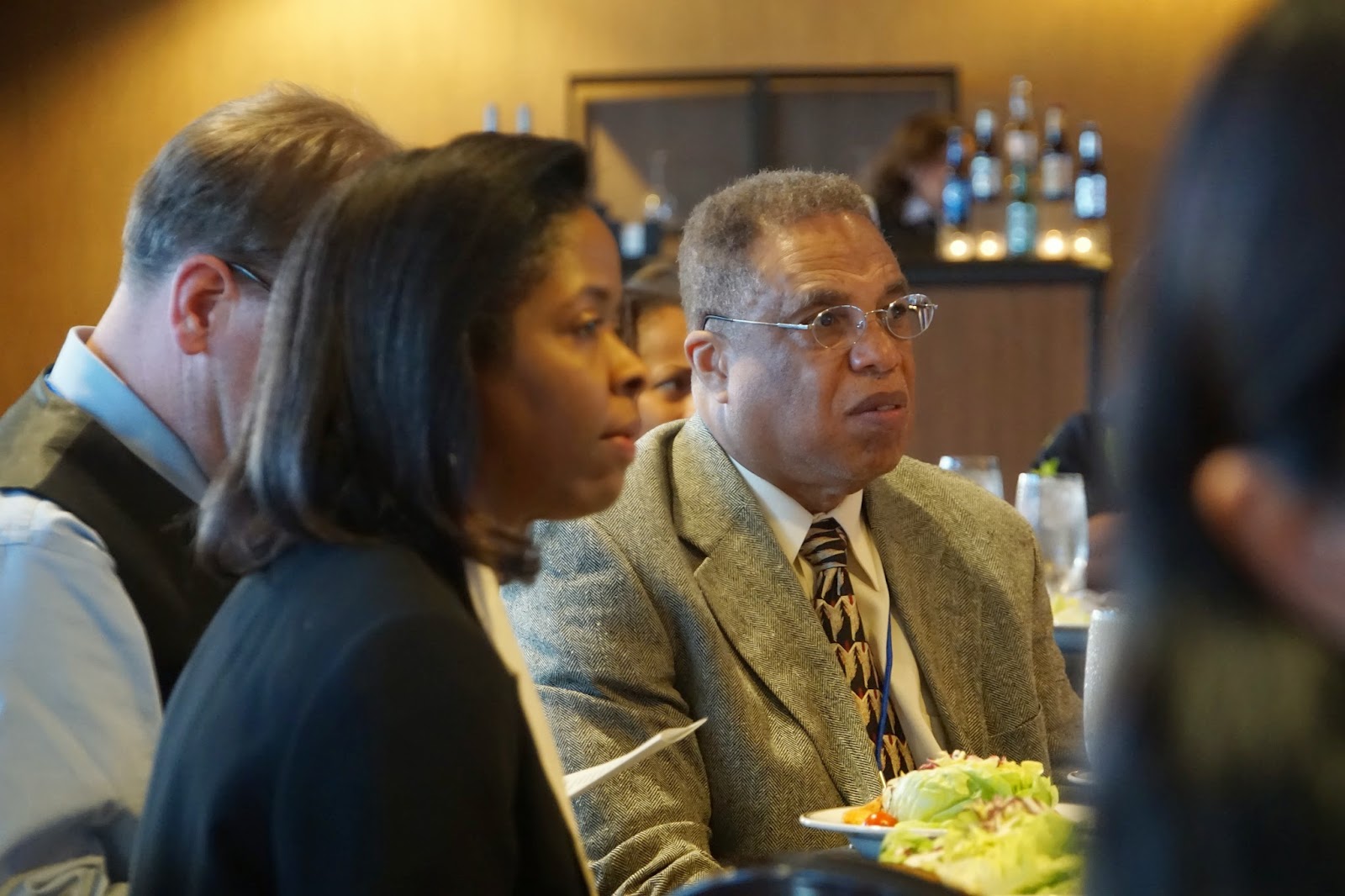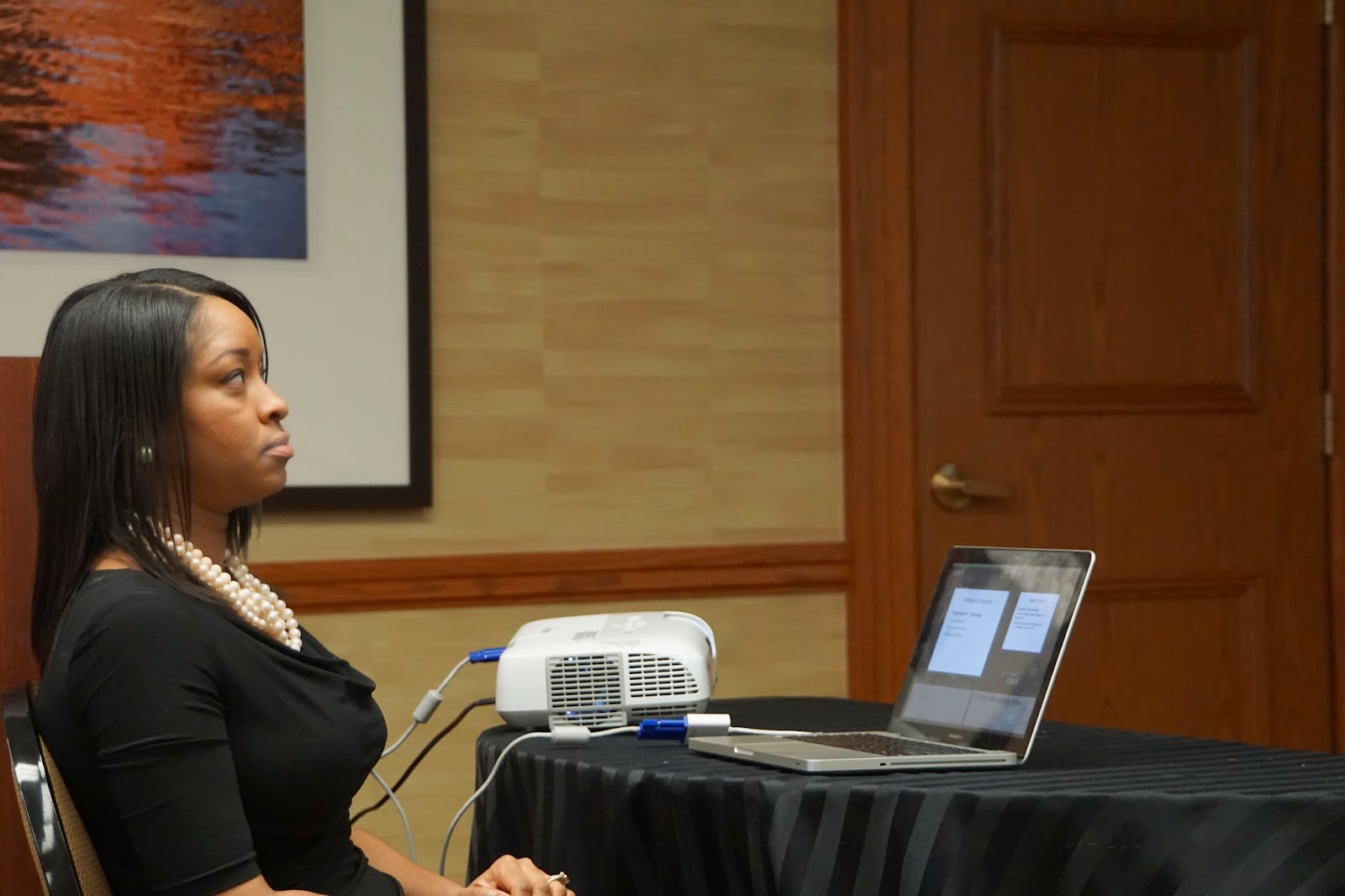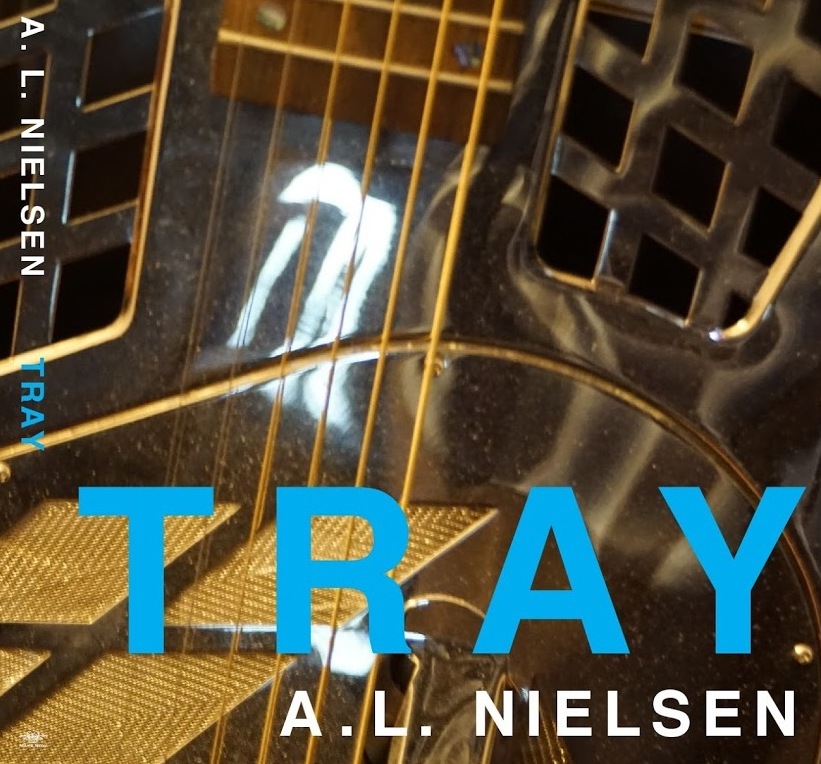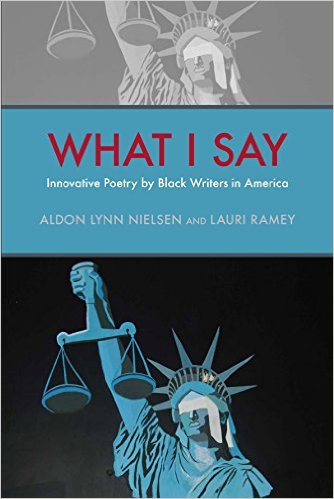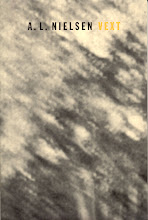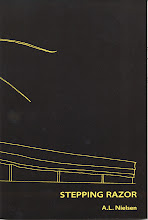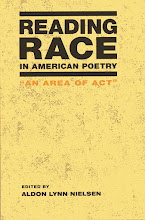Wednesday, April 29, 2015
FLYING HOME - SEVEN STORIES OF THE SECRET CITY, BY DAVID NICHOLSON
I first met David Nicholson when we were both students at Federal City College, in courses on Criticism and in Caribbean Literature. David was also one of the editors of the school's literary mag, Slave Speaks, where we both published some of our first writings.
Now, I'm happy to report, here is David's first book of fiction, to be released next month by Rick Peabody's Paycock Press.
After graduating from FCC, by then rechristened the University of the District of Columbia, David went on to earn an MFA at Iowa. Upon his return he founded the Black Film Review and began publishing his fiction in journals. For many years he was on the editorial staff of the Washington Post Book World.
But back when we first met, he was working at a record store in NorthWest D.C., living in a nearby apartment. We were both working students (I suspect most of the FCC students were in that time), but what really brought us together was a nearly obsessive interest in literary arts and in music.
Both of those early obsessions find their way into Nicholson's fiction, and his work has been quietly recognized over the years by discerning readers. Open the leaf of this first volume and you'll find blurbs from E. Ethelbert Miller, James Alan McPherson, Henry Louis Gates, Arnold Rampersad, Sara Henry, and that's on top of the blurb from Charles Johnson that graces the back cover.
Back in my school days, Constance Green published a book with Princeton titled The Secret City: A History of Race Relations in the Nation's Capital. If you read or watch much media coverage of D.C., you'll quickly see that the life of the nation's capital is still largely a secret, often even from the people who move to the city to serve in government. But that inner life of the capital is a secret to them because they will it to be so.
Nicholson's book gives us the lives that enliven that unrepresented space. That said, this is not reportage. These stories are wonderfully imagined projections out of the daily; like Miles, David has written what the day recommends.
Among my favorites, "Saving Jimi Hendrix," which appeared in an earlier Paycock Press collection, Kiss the Sky. Among all the other things this story does, it returns us to the author's "lost city" where he is "always 16," an alternate universe informing our own.
You can preorder this wonderful book by clicking here.
Friday, April 24, 2015
RACHEL LODEN'S KULCHUR GIRL
"Wittman had been there at Berkeley when Charles Olson read--and drew, spreading wide his arms, a map of the universe on the chalkboard--circles and great cosmic rings. And Lew Welch dangling his legs off the corner of the platform and nodding in rhythm . . . "
--Tripmaster Monkey, Maxine Hong Kingston
Kingston, Wittman Ah Sing's creator, had been there too, and so, it turns out, had Rachel Loden.
I love the cover of Loden's book. Back in the day, you got those punch cards to register for university courses. The cards in use at Berkeley at the time of the Berkeley Poetry Conference still had an attendance record running along the top. You needed a ticket to attend the Poetry Conference events, and you registered for the thing as you would for a regular university course. This card, dated July 16, 1965, gives Loden's Westport, Connecticut, address and shows that she paid $45 for the two seminars and the readings she was able to attend. The conference was run through the university's extension program, and the then seventeen year old Loden had earned the fees by babysitting.
"LeRoi Jones was supposed to be here but he may not come. / Headline on the Realist: / 'You Don't Have to be Jewish to Love LeRoi Jones.'"
That Paul Krassner had one wicked sense of humor, AND read poetry. People who never saw The Realist would probably think of something like The Onion if you tried to describe it to them.
"This conference heartens and alarms me," Loden writes in one of the two notebooks she had with her; a page from one of them is reproduced in this book.
There is so much going on here. An entry marked "Olson #5" starts out with a simple citation: "Harlem Gallery. Twayne. Tolson." How much longer would it take mainstream American literary criticism to make that connection?
Later: "Leroy McLucas & Dorn - a book - " The reference is to The Shoshoneans, a book of text and photographs that grew out of a road trip the poet and photographer made together.
On the same page: "The poets were always real to me but now I've seen them. Strangely there are no further realities after that first one of knowing and believing the poems themselves."
In the section on Olson's reading we suddenly get: "A voiceless Ezra Pound watches LeRoi Jones Dutchman & Jennifer West -- "
In the end, it comes to Bob Dylan, as all things must -- but hey, it was 1965:
"WMCA turns people on" says the ad.
Help! The Beatles.
You said you'd never compromise
With the mystery tramp, but now you realize
Talking 1965.
You're in the free world -- now you've got to stay here.
Loden's notebooks give us a window on a crucial moment in the history of American culture that can only be matched by watching film of the event itself. And even watching the film you would miss so much. You wonldn't have seen Wittman Ah Sing, for example.
Kulchur was still publishing in 1965. It was a place where you might find that same energy and similar constellations of poetics. Loden learned from it, and so can we.
Thursday, April 23, 2015
NATHANIEL MACKEY AT PENN STATE
As with the old time people, the
word their one rescue, words
would be our rescue we'd been
told. Believing so braced us,
book
of the book's advantage, book of
the word's leverage, lift . . .
Nathaniel Mackey was up from Duke to visit us April 12-15. Things started off with a public interview as part of our Comparative Literature Monday series. Jonathan Eburne marshalled the time; questions flew from Laura Vrana, Abram Foley, Susan Wheeler and me. The interview was recorded for later airing on cable television and will at some point be available on the PSU Comp Lit web site.
The following day, Mackey met with our graduate students for a seminar, then closed out the visit with a powerful reading, followed by Q&A. This was the first reading I'd heard from the forthcoming volume, Blue Fasa, which can be ordered here.
word their one rescue, words
would be our rescue we'd been
told. Believing so braced us,
book
of the book's advantage, book of
the word's leverage, lift . . .
Nathaniel Mackey was up from Duke to visit us April 12-15. Things started off with a public interview as part of our Comparative Literature Monday series. Jonathan Eburne marshalled the time; questions flew from Laura Vrana, Abram Foley, Susan Wheeler and me. The interview was recorded for later airing on cable television and will at some point be available on the PSU Comp Lit web site.
The following day, Mackey met with our graduate students for a seminar, then closed out the visit with a powerful reading, followed by Q&A. This was the first reading I'd heard from the forthcoming volume, Blue Fasa, which can be ordered here.
There was a when, some called it
whoa, something known as time we
were in. Something said to be next
rolled in, rolled on and away, rolled,
might
soul be something we
saw
Tuesday, April 21, 2015
POETRY FROM THE HOUSE OF ZU - E. ETHELBERT MILLER - THE ALDON NIELSEN PROJECT 09
Q. Do you feel Ahmos Zu-Bolton's contribution to African American literature has been overlooked?
When Lorenzo Thomas was considering leaving his home in New York and moving to Houston, one of his Umbra buddies told him that if he went to Texas, he would not be known as a southern poet; he would be an unknown poet.
Blackjack told me
for the 7th time
this week –
bout being in the lost
& found cell
–Ahmos Zu-Bolton II
I’m pretty sure I first saw the name “Ahmos Zu-Bolton II,” pretty sure because it’s not a name you’d forget in any context, because it’s a name that makes you wonder who the first Ahmos Zu-Bolton may have been, when I was in a D.C. book shop and picked up a copy of Synergy D.C. Anthology. – Picked it up because it was D.C., because I liked the rhyme in the title, because the all black cover had a circle cut in it through which the title was revealed from what bibliographers call the half- title page beneath. On the full title page, Zu-Bolton’s name appeared as co-editor of the volume with E. Ethelbert Miller.. I was not that long back from my draft duties in upstate New York, had missed out on much of the early seventies poetry communities of D.C. (Though I got to know pretty much everybody in those communities in the coming years.) Here was a book promising, well . . . , synergy. I bought it.
There were some names in the contents I haven’t seen in later years: Shirley Jones, Hamisi, Ebara (poets were way ahead of pop music in doing the one name thing), Anyeaum, Elgeria Farmer, Susan Thomas . . . There were some names I already knew from my reading: Sterling Brown, May Miller, Gaston Neal (who I’d seen in a TV news segment about the New School for Afro American Thought when I was a teenager, then saw in the landmark anthology Black Fire), Dolores Kendrick, Jodi Braxton. And there were names of poets I was soon to meet: Adesanya Alakoye (who appeared and as quickly disappeared from Algebra class at FCC), Winston Napier, Joanne Jimason, and the editors themselves. Napier was to become a friend in the next decade when I was teaching at Howard and he was a graduate philosophy student. Winston used to drop by the office to argue fine points of Heidegger and Locke with me, so it was no surprise when he later edited a major anthology of black theory and criticism. Joanne became a very good friend, but then she went to California, and when I went to California she had gone back East.
I encountered Zu-Bolton’s name again when he appeared as editor of the mag Hoo Doo. Number 1 came out in 1972, but I didn’t see it till later. I noticed that it was a project of energy blacksouth press, also the publisher of the Synergy collection, and reckoned the press must be Zu-Bolton’s projection. Here again I encountered names I knew: May Miller, Pinkie Gordon Lane, Dudley Randall, Ron Welburn, Kalamu ya Salaam. This may well have been the first time I saw the name of Jerry Ward, here represented by two poems: “Heavy Feelings” (“I will not windex realities”) and “Generation Gap.” Soon enough I would come to know Ward’s critical work, which would continue to be important to me and to so many others. Whoever this Zu-Bolton was, he was assembling a significant roster of contributors. Here, too, I saw again the name of Lorenzo Thomas, signed to the poem “Sounds of Joy,” emblematic of what was to be one of the most important friendships of my life.
I kept an eye out for further issues of Hoo Doo and for its editor. I believe I have the full run of the mag. That first issue included a couple poems by Zu-Bolton that were to reappear in his books, “From the Diary of Livewire Davis” (we were all still writing those personae poems with third person characters we’d thought up, though none of ours tended to the Prufrockian any more), and a piece titled “Spirit Chant” that Zu-Bolton had co-authored with Russell Chew. Like early issues of Rick Peabody’s Gargoyle, each Hoo Doo had a different look to it, though not, as Gargoyle sometimes did, a different shape. Hoo Doo II/III was not only a double issue, but a double issue published in the format of those old sci fi double paperbacks, where you’d read one novel through, then flip the book over and read the second novel from back to middle. When you got to the contributors notes page of Hoo Doo II if you turned the page you found yourself looking at the contributors notes for Hoo Doo III upside down. By issue III, the mag included poets such as Alvin Aubert, Sarah Webster Fabio, Michael S. Harper, Audre Lorde, Eugene Redmond, Alice Walker and the breath-taking Jay Wright. Zu-Bolton kept up that level of quality through the run of the journal. Number 5 was a special woman’s issue guest edited by Lucille Clifton, Amma Khalil (what became of her? In Ethelbert’s book Fathering Words you can read an amusing anecdote of the day they both got rejection letters from Hoo Doo - this was before either had met Zu-Bolton), and Audre Lorde. This began a short string of guest edited issues. The next one is (I love this) Hoo Doo 6 ½, edited by Lorenzo Thomas and Adesanya Alakoye. That issue has early Harryette Mullen poems and an essay on Baraka by Lorenzo that I don’t think has ever been republished. Hoo Doo 7 was ably edited by June Jordan, Stephen Henderson and Ethelbert Miller. Apparently by then Ethelbert, Amma and Stephen Henderson had figured out what a Hoo Doo poem was (the question that had stumped them earlier), and now they were the ones deciding what work was genuinely Hoo Doo. That issue, dated 1980, teases readers on the last page with the promise of a Hoo Doo 8, to be guest edited by Julius Thompson and Jerry Ward, themed around Blues & Dues. Despite the impressive list of poets to be included in the planned number 8, it never happened, and more’s the pity. Still, Hoo Doo’d had a good run, better than most, and left a legacy that scholars need to tend to.
I finally met up with Zu-Bolton when he came back to D.C. from wherever for a reading with Alakoye. Did Zu-Bolton arrive late in a cab, or do I just remember that because he read his “Taxicab Blues” that evening? The reading was in the upstairs space at D.C. Space; same space was the place I’d seen the Sun Ra Arkestra, Amiri Baraka with Steve McCall, David Murray and Fred Hopkins, Don Cherry, Anthony Davis, Sam Rivers with Dave Holland – so many great sets before the fire authorities made them stop crowding audiences into that area and start having all the shows in the restaurant downstairs. The place (at 7th and E, NW) was always a friend to poetry. Ethelbert produced a weekend marathon there and I read there once with Thad Ziolkowski, now well known as a novelist and memoirist.
We could well ask this same question of so many. Why isn’t Tom Dent better known even now? Why is so little written about Julius Thompson? Looking farther back, why so little attention to May Miller Sullivan?
heading west we cross
the great Sabine:
river of cypresses/ or
rio de sabinas
my son aks me
through the morning’s lost sleep
if real desperadoes live in Texas
“we are from a land
that is trying to assassinate love”
I tell him.
–Ahmos Zu-Bolton II
Zu-Bolton was a true literary activist, sometimes seeming more intent on distributing the works of others than looking to his own “career” as a poet. Still, you’d think the mere fact of his marriage to Harryette Mullen would have attracted the notice of one or two among the many who are now writing about her work. You’d think that the work he’d done as editor and publisher might have attracted the notice of critics working on the histories of American poetry of the later part of the twentieth century. It has often been the case that editing a journal was key to a poet’s appearing in other people’s journals and garnering a reputation. Zu-Bolton was tremendously helpful to many poets of the seventies and eighties in particular, and many openly acknowledge that help. Still, for most of that time his own work was only seen in the small press mags, and few have seen that 1975 chapbook from Solo Press.
ollie street is 2 blocks long
with a dead-end both ways.
our nation. where
home was.
Or
They told me that California
was upnorth, and Chicago
somewhere in Canada.
Zu-Bolton was clearly on his way to something, though that something was clearly not fame, or even the slight recognition of critical mention. It always struck me that he had sensed that long ago. That 1975 chapbook closes with a poem much in the spirit of Baraka’s Preface to a Twenty Volume Suicide Note. It’s a closing note of opening:
intro to my final book of poems
this is to say that I am
coming round the bend. the darkness
inside your flashes of light know me.
i throw you curves cause i wanted to be
a pitcher. a sidearming hero
you could turn to
in the late innings (i would
save the game
before my wounded brother got to
the shower.
but this ain’t no playground
they told me. that & the fact
that i never mastered
the screw-
ball
is the reason i am here.
When Lorenzo Thomas was considering leaving his home in New York and moving to Houston, one of his Umbra buddies told him that if he went to Texas, he would not be known as a southern poet; he would be an unknown poet.
Blackjack told me
for the 7th time
this week –
bout being in the lost
& found cell
–Ahmos Zu-Bolton II
I’m pretty sure I first saw the name “Ahmos Zu-Bolton II,” pretty sure because it’s not a name you’d forget in any context, because it’s a name that makes you wonder who the first Ahmos Zu-Bolton may have been, when I was in a D.C. book shop and picked up a copy of Synergy D.C. Anthology. – Picked it up because it was D.C., because I liked the rhyme in the title, because the all black cover had a circle cut in it through which the title was revealed from what bibliographers call the half- title page beneath. On the full title page, Zu-Bolton’s name appeared as co-editor of the volume with E. Ethelbert Miller.. I was not that long back from my draft duties in upstate New York, had missed out on much of the early seventies poetry communities of D.C. (Though I got to know pretty much everybody in those communities in the coming years.) Here was a book promising, well . . . , synergy. I bought it.
There were some names in the contents I haven’t seen in later years: Shirley Jones, Hamisi, Ebara (poets were way ahead of pop music in doing the one name thing), Anyeaum, Elgeria Farmer, Susan Thomas . . . There were some names I already knew from my reading: Sterling Brown, May Miller, Gaston Neal (who I’d seen in a TV news segment about the New School for Afro American Thought when I was a teenager, then saw in the landmark anthology Black Fire), Dolores Kendrick, Jodi Braxton. And there were names of poets I was soon to meet: Adesanya Alakoye (who appeared and as quickly disappeared from Algebra class at FCC), Winston Napier, Joanne Jimason, and the editors themselves. Napier was to become a friend in the next decade when I was teaching at Howard and he was a graduate philosophy student. Winston used to drop by the office to argue fine points of Heidegger and Locke with me, so it was no surprise when he later edited a major anthology of black theory and criticism. Joanne became a very good friend, but then she went to California, and when I went to California she had gone back East.
I encountered Zu-Bolton’s name again when he appeared as editor of the mag Hoo Doo. Number 1 came out in 1972, but I didn’t see it till later. I noticed that it was a project of energy blacksouth press, also the publisher of the Synergy collection, and reckoned the press must be Zu-Bolton’s projection. Here again I encountered names I knew: May Miller, Pinkie Gordon Lane, Dudley Randall, Ron Welburn, Kalamu ya Salaam. This may well have been the first time I saw the name of Jerry Ward, here represented by two poems: “Heavy Feelings” (“I will not windex realities”) and “Generation Gap.” Soon enough I would come to know Ward’s critical work, which would continue to be important to me and to so many others. Whoever this Zu-Bolton was, he was assembling a significant roster of contributors. Here, too, I saw again the name of Lorenzo Thomas, signed to the poem “Sounds of Joy,” emblematic of what was to be one of the most important friendships of my life.
I kept an eye out for further issues of Hoo Doo and for its editor. I believe I have the full run of the mag. That first issue included a couple poems by Zu-Bolton that were to reappear in his books, “From the Diary of Livewire Davis” (we were all still writing those personae poems with third person characters we’d thought up, though none of ours tended to the Prufrockian any more), and a piece titled “Spirit Chant” that Zu-Bolton had co-authored with Russell Chew. Like early issues of Rick Peabody’s Gargoyle, each Hoo Doo had a different look to it, though not, as Gargoyle sometimes did, a different shape. Hoo Doo II/III was not only a double issue, but a double issue published in the format of those old sci fi double paperbacks, where you’d read one novel through, then flip the book over and read the second novel from back to middle. When you got to the contributors notes page of Hoo Doo II if you turned the page you found yourself looking at the contributors notes for Hoo Doo III upside down. By issue III, the mag included poets such as Alvin Aubert, Sarah Webster Fabio, Michael S. Harper, Audre Lorde, Eugene Redmond, Alice Walker and the breath-taking Jay Wright. Zu-Bolton kept up that level of quality through the run of the journal. Number 5 was a special woman’s issue guest edited by Lucille Clifton, Amma Khalil (what became of her? In Ethelbert’s book Fathering Words you can read an amusing anecdote of the day they both got rejection letters from Hoo Doo - this was before either had met Zu-Bolton), and Audre Lorde. This began a short string of guest edited issues. The next one is (I love this) Hoo Doo 6 ½, edited by Lorenzo Thomas and Adesanya Alakoye. That issue has early Harryette Mullen poems and an essay on Baraka by Lorenzo that I don’t think has ever been republished. Hoo Doo 7 was ably edited by June Jordan, Stephen Henderson and Ethelbert Miller. Apparently by then Ethelbert, Amma and Stephen Henderson had figured out what a Hoo Doo poem was (the question that had stumped them earlier), and now they were the ones deciding what work was genuinely Hoo Doo. That issue, dated 1980, teases readers on the last page with the promise of a Hoo Doo 8, to be guest edited by Julius Thompson and Jerry Ward, themed around Blues & Dues. Despite the impressive list of poets to be included in the planned number 8, it never happened, and more’s the pity. Still, Hoo Doo’d had a good run, better than most, and left a legacy that scholars need to tend to.
I finally met up with Zu-Bolton when he came back to D.C. from wherever for a reading with Alakoye. Did Zu-Bolton arrive late in a cab, or do I just remember that because he read his “Taxicab Blues” that evening? The reading was in the upstairs space at D.C. Space; same space was the place I’d seen the Sun Ra Arkestra, Amiri Baraka with Steve McCall, David Murray and Fred Hopkins, Don Cherry, Anthony Davis, Sam Rivers with Dave Holland – so many great sets before the fire authorities made them stop crowding audiences into that area and start having all the shows in the restaurant downstairs. The place (at 7th and E, NW) was always a friend to poetry. Ethelbert produced a weekend marathon there and I read there once with Thad Ziolkowski, now well known as a novelist and memoirist.
We could well ask this same question of so many. Why isn’t Tom Dent better known even now? Why is so little written about Julius Thompson? Looking farther back, why so little attention to May Miller Sullivan?
heading west we cross
the great Sabine:
river of cypresses/ or
rio de sabinas
my son aks me
through the morning’s lost sleep
if real desperadoes live in Texas
“we are from a land
that is trying to assassinate love”
I tell him.
–Ahmos Zu-Bolton II
Zu-Bolton was a true literary activist, sometimes seeming more intent on distributing the works of others than looking to his own “career” as a poet. Still, you’d think the mere fact of his marriage to Harryette Mullen would have attracted the notice of one or two among the many who are now writing about her work. You’d think that the work he’d done as editor and publisher might have attracted the notice of critics working on the histories of American poetry of the later part of the twentieth century. It has often been the case that editing a journal was key to a poet’s appearing in other people’s journals and garnering a reputation. Zu-Bolton was tremendously helpful to many poets of the seventies and eighties in particular, and many openly acknowledge that help. Still, for most of that time his own work was only seen in the small press mags, and few have seen that 1975 chapbook from Solo Press.
ollie street is 2 blocks long
with a dead-end both ways.
our nation. where
home was.
Or
They told me that California
was upnorth, and Chicago
somewhere in Canada.
Zu-Bolton was clearly on his way to something, though that something was clearly not fame, or even the slight recognition of critical mention. It always struck me that he had sensed that long ago. That 1975 chapbook closes with a poem much in the spirit of Baraka’s Preface to a Twenty Volume Suicide Note. It’s a closing note of opening:
intro to my final book of poems
this is to say that I am
coming round the bend. the darkness
inside your flashes of light know me.
i throw you curves cause i wanted to be
a pitcher. a sidearming hero
you could turn to
in the late innings (i would
save the game
before my wounded brother got to
the shower.
but this ain’t no playground
they told me. that & the fact
that i never mastered
the screw-
ball
is the reason i am here.
Friday, April 17, 2015
COLLEGE LANGUAGE ASSOCIATION 2015 - Dallas
Another CLA conference, and another anniversary of this blog. We gathered in Dallas, first time the conference has been West of the Mississippi during the year's I've been attending, and next year we're going to Houston.
Hats were in evidence.
Our panel was on the first afternoon, and I presented another section of my work on C.L.R. James at the Institute of the Black World in Atlanta in the early seventies. This chapter is destined for a book porbably coming out from Duke that collects essays reconsidering Black Jacobins. The panel reunited me with my old friend Dolan Hubbard, chair of English at Morgan State, and introduced me to a new friend, Min Zhou, who is a professor of literary studies and associate dean at Shanghai International Studies University.
This year's recipient of the Langston Hughes Society Award was Everett Hoagland, who I had not seen since a University of Maine conference a decade back. Everett did read from his own poetry, but he also gave a wonderful talk about meeting Hughes when a Lincoln University undergrad, and the importance of Hughes to his own work and that of others of his generation.
I see that the New Bedford newspaper took notice of this far away event. Click here to read the article.
Jean Philippe Marcoux and I, on a stroll through the neighborhood, came across a sculpture gallery that was exhibiting the works of Melvin Edwards, who was married to the poet Jayne Cortez. The gallery was showing the complete "Lynch Fragments" series, some of which inspired early poetry by Cortez. You can see Edwards's images in many of the poet's books.
Among the panelists on the session I chaired were these two remarkable young men from Morehouse.
This year's conference alos reunited me with my dear Wuhan friend, Lianggong Luo.
Kenton Rambsy, now Dr. Kenton Rambsy, was in the house.
Subscribe to:
Posts (Atom)




































